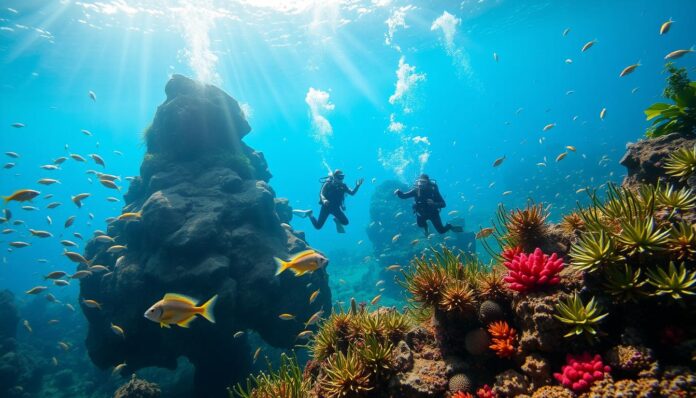| Best Time to Travel | August to December |
| What to Expect | Warm water, clear visibility, diverse marine life |
| Diving Conditions | Year-round, but best from August to December |
| Marine Life | Cichlids, catfish, sharks, turtles, dolphins, fish |
Have you ever wondered what secrets lie beneath the surface of the world’s most biodiverse freshwater lake? Lake Malawi calls to adventurous divers with its clear waters and unique underwater world. It promises an unforgettable Scuba Diving in Malawi experience.
Lake Malawi stretches 365 miles long, making it a hidden treasure for underwater exploration. Its waters are clear up to 30 meters and warm, ranging from 23 to 29 degrees Celsius. This makes it perfect for divers of all skill levels.
The lake’s underwater world is home to over 1,000 cichlid species. This makes Lake Malawi a global hotspot for marine biodiversity. Divers can find amazing marine life just minutes from shore. With more than 10 accessible dive sites, there are unforgettable underwater adventures waiting.
Key Takeaways – Scuba Diving in Malawi
- Lake Malawi offers world-class underwater exploration opportunities
- Over 1,000 unique cichlid species inhabit the lake
- Diving conditions are ideal with warm waters and exceptional visibility
- Multiple dive sites available within minutes of shore
- Suitable for divers of all experience levels
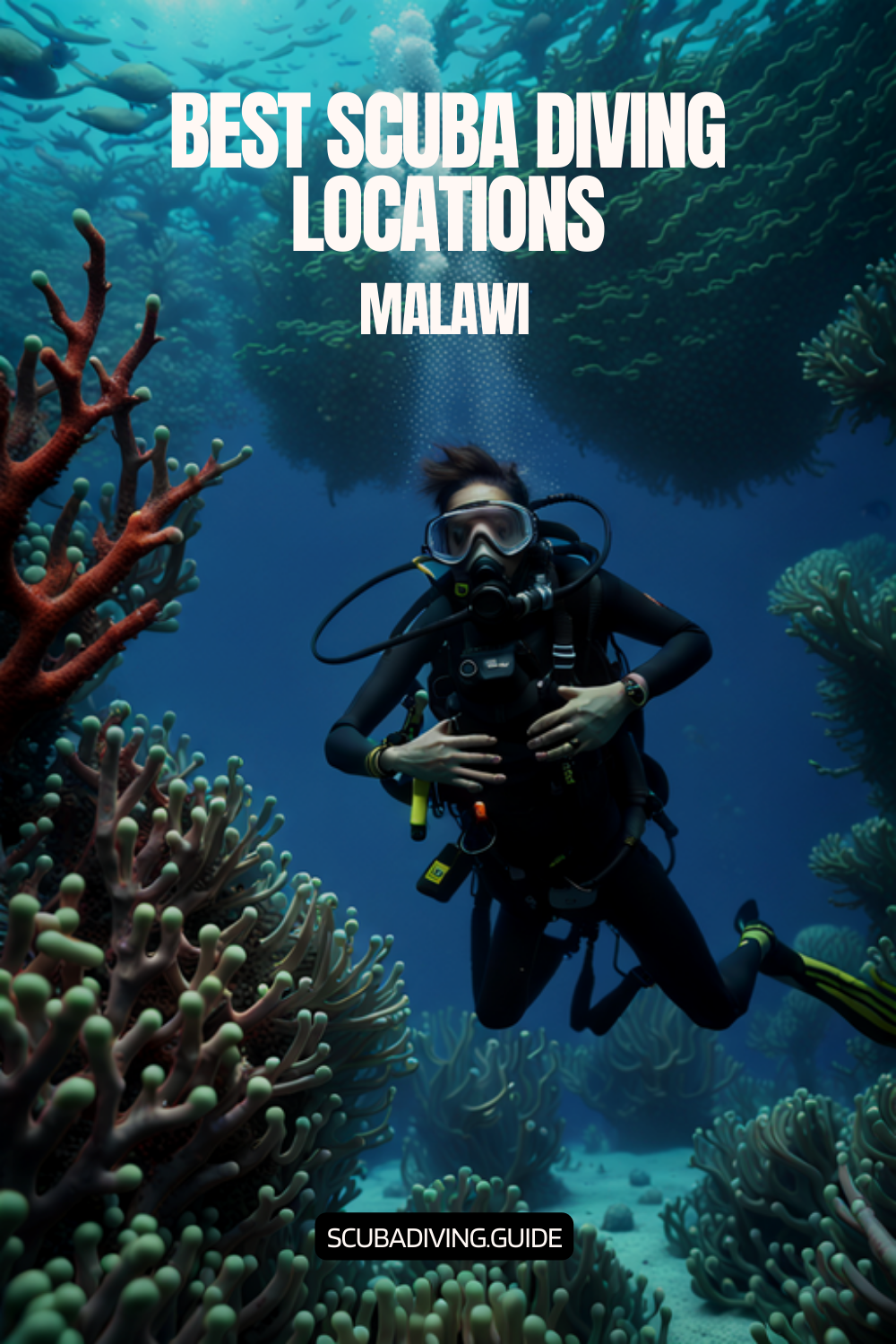
Overview of Scuba Diving in Malawi
Lake Malawi is a stunning spot for freshwater diving. It offers an unmatched underwater experience that draws scuba lovers worldwide. Its Tropical Fish Diversity makes it a unique gem in Africa.
What Makes Lake Malawi Unique?
Lake Malawi is special because of its location in the Great Rift Valley. It’s the ninth largest lake globally and the third largest in Africa. It stretches 365 miles long and covers about 11,429 square miles.
The Diverse Aquatic Life
Malawi Marine Parks reveal an amazing underwater world full of life. The lake is home to an incredible number of fish species:
- Over 1,000 unique fish species inhabit the lake
- 30% of all known cichlid species are found here
- Almost all cichlid species are endemic to Lake Malawi
- Approximately 90% of freshwater aquarium fish originate from this lake
“Lake Malawi is recognized as the most biodiverse freshwater lake on the planet” – Marine Biodiversity Research Institute
Best Times to Dive
For the best diving, consider these factors:
- Water temperature ranges from 23 to 29 degrees Celsius
- Visibility often exceeds 10 meters
- Dive sites are typically accessible within 10 minutes from shore
- Typical dive costs start as low as $50
Whether you’re new or experienced, Lake Malawi offers an unforgettable dive. Its rich marine ecosystem and clear diving conditions make it a must-see.
Essential Gear for Diving in Malawi
Getting ready for an amazing dive in Lake Malawi means picking the right scuba gear. For those who love African Adventure Travel, the right equipment is key to a great dive.
Knowing what gear you need is important. Dive operators in Malawi usually have everything you need. But, seasoned divers might want their own gear for comfort and ease.
Recommended Scuba Equipment
- Mask: Make sure it fits well for clear views underwater
- Wetsuit: A 3 mm wetsuit is best for Malawi’s water
- Fins: Choose fins that are comfy and the right size
- Dive computer: It helps track your dive safely
- Regulator: It’s vital for breathing underwater
Renting vs. Buying Gear
Dive operators in Malawi have great packages. At Kande Beach, a full dive with rental costs about $35. This is a good choice for those who want it easy.
| Gear Type | Rental Cost | Personal Purchase Recommendation |
|---|---|---|
| Mask | $5-10 | Highly recommended to buy personal mask |
| Wetsuit | $15-25 | Consider personal purchase for comfort |
| BCD | $20-30 | Rental often more practical |
Importance of Personal Gear
Having your own diving gear means comfort, a good fit, and knowing what you have. While rentals are great, your own mask, fins, and wetsuit make diving in Lake Malawi better.
“The right gear transforms a good dive into an extraordinary experience.” – Professional Diving Instructor
Don’t forget to bring extra things like a headlamp, natural sunscreen, and bug spray. They help make your diving trip safe and fun.
Finding the Best Dive Schools
Scuba diving in Malawi is a chance to see a unique freshwater world. Choosing the right dive school makes your dive unforgettable.
Lake Malawi’s dive schools are great for all divers. The water is clear, and the temperature is just right for a memorable trip.
Top-Rated Dive Operators
- Cape Maclear Scuba: Offers courses from Open Water to Divemaster
- Aqua Africa: Known for unique night dives
- Blue Zebra Island Lodge: Offers diving near Likoma Island
Certification and Training Options
Dive schools in Malawi have courses for all levels. Prices start at $50 per dive, making it easy for everyone to dive.
Group vs. Private Lessons
| Lesson Type | Advantages | Cost |
|---|---|---|
| Group Lessons | Social interaction, lower cost | $50-$75 per session |
| Private Lessons | Personalized instruction, flexible scheduling | $100-$150 per session |
“Learning to dive in Lake Malawi is not just a skill, it’s an experience that connects you with one of the most unique ecosystems on the planet.” – Local Dive Instructor
Malawi’s dive sites are just a short boat ride away. You can explore a UNESCO World Heritage site. It’s a dive journey you won’t forget.
Popular Diving Locations in Lake Malawi
Lake Malawi is a paradise for divers, with its vast underwater world. It’s the third largest lake in Africa. This Rift Valley Destination is known for its unique marine landscapes, attracting divers worldwide.
Diving in Lake Malawi’s Malawi Marine Parks is a treat. The lake’s incredible biodiversity makes it a top spot for underwater explorers.
Nkhata Bay: A Diver’s Paradise
Nkhata Bay is a top diving spot with amazing underwater experiences. Divers can enjoy:
- Crystal-clear waters with exceptional visibility
- Diverse cichlid fish populations
- Unique rock formations
- Multiple dive sites for various skill levels
Cape Maclear: Underwater Wonderland
Cape Maclear is a must-visit for divers, with 10 distinct dive sites. These sites feature:
- Sandy bottoms
- Magnificent cliff structures
- Intricate swim-through passages
- Rich marine biodiversity
| Dive Location | Maximum Depth | Key Features |
|---|---|---|
| Kande Island | 40 feet | Shallow reef exploration |
| John’s Reef | 90 feet | Deep diving experience |
“Lake Malawi is not just a lake, it’s an underwater kingdom waiting to be discovered.” – Local Dive Instructor
Hidden Gems Around the Lake
Lake Malawi also has secret diving spots for the adventurous. Divers can find:
- Remote rocky coastlines
- Secluded underwater caves
- Less-explored marine ecosystems
Understanding Scuba Diving Levels
Scuba Diving in Malawi offers an amazing underwater adventure for all divers. The beautiful Lake Malawi has a wide range of underwater sights. This makes it perfect for memorable dives for every skill level.
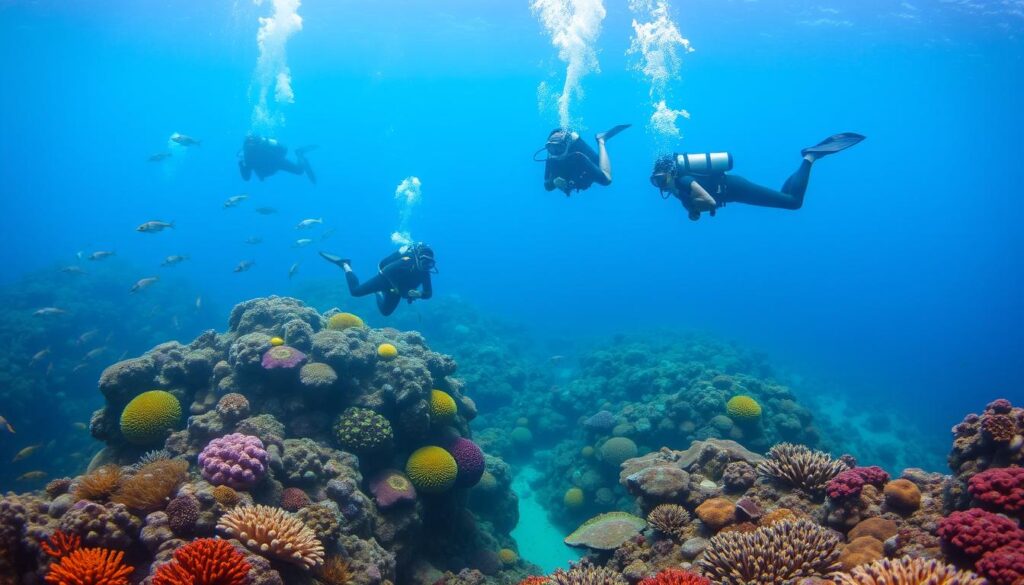
Lake Malawi is a UNESCO World Heritage Site known for its clear waters. Divers can see up to 30 metres down. With over 23 dive sites, there’s something for everyone.
Beginner Dives for Novices
For new divers, Lake Malawi has gentle spots. These areas have calm waters and little current. Good places for beginners include:
- Shallow areas near Cape Maclear
- Protected bays with minimal wave action
- Guided introductory dives with certified instructors
Intermediate Diving Challenges
More experienced divers can tackle deeper sites. These areas offer a chance to see the lake’s rich marine life. This includes its famous 600 endemic cichlid fish species.
Advanced Diving Experiences
For the experts, Lake Malawi’s deeper parts offer exciting dives. A highlight is a small shipwreck 30 metres down. It’s home to big catfish and great for a Deep Dive certificate.
| Diving Level | Recommended Sites | Difficulty |
|---|---|---|
| Beginner | Cape Maclear | Low |
| Intermediate | Nkhata Bay | Medium |
| Advanced | Shipwreck Site | High |
“Lake Malawi provides an unparalleled underwater exploration experience for divers of every skill level.” – Local Diving Expert
Divers can improve their skills with courses like the four-day Open Water program. It’s offered at Danforth Lodge for £370. The program includes full instruction and all the gear you need.
Safety Tips for Scuba Diving
Exploring Lake Malawi’s underwater world needs careful planning and safety focus. Scuba diving here offers a thrilling African adventure. But, knowing key safety rules is key for a fun dive.
Dive Buddy System: Your Underwater Safety Net
The buddy system is a vital safety rule for diving in Malawi. Divers should:
- Always dive in pairs
- Check each other’s gear before diving
- Keep an eye on each other underwater
- Have clear ways to communicate
Essential Pre-Dive Safety Checks
Doing thorough safety checks before diving can avoid emergencies. Follow the “Plan Your Dive, Dive Your Plan” rule with these steps:
- Check your health
- Make sure your gear is in good shape
- Check your air and gauge
- Know what to do in an emergency
Recognizing and Mitigating Aquatic Hazards
Lake Malawi has its own diving challenges. Knowing the risks is important:
| Hazard | Prevention Strategy |
|---|---|
| Bilharzia | Take Praziquantel medication 6-8 weeks after diving |
| Water-borne Diseases | Avoid swallowing water, use protective gear |
| Underwater Currents | Stay close to guide, maintain proper buoyancy |
“Safety doesn’t happen by accident. It’s a deliberate and continuous process.” – Unknown Diving Expert
By sticking to these tips, divers can reduce risks and enjoy Malawi’s amazing underwater world.
Marine Conservation Efforts in Malawi
Lake Malawi is a key treasure for the world’s biodiversity. It’s one of Africa’s top Eco-Tourism Hotspots. The lake is home to a vast Tropical Fish Diversity that needs our care.
Keeping this aquatic wonder safe needs teamwork. Malawi Marine Parks are key in keeping the lake’s ecosystem in balance.
Ecosystem Protection Strategies
Conservation efforts focus on several areas:
- Preserving habitats of endemic cichlid species
- Monitoring water quality and environmental changes
- Implementing sustainable fishing practices
- Developing educational programs for local communities
Community Engagement
Local communities are vital to conservation success. Malawi has shown how to protect the environment through community involvement. Sustainable tourism helps by providing jobs and income.
Diver Contributions
Scuba divers can help marine conservation in many ways:
- Using reef-safe sunscreen
- Avoiding touching marine life
- Participating in underwater cleanup activities
- Supporting local conservation organizations
“Every dive is an opportunity to protect and respect our planet’s most precious underwater ecosystems.”
Lake Malawi, with over 600 fish species and UNESCO World Heritage status, is a global treasure. It needs our ongoing protection and respect.
Planning Your Diving Trip
Going on a Scuba Diving in Malawi adventure needs careful planning. The Rift Valley Destinations offer unique underwater experiences. They require thoughtful planning for an unforgettable African Adventure Travel experience.
Choosing the Right Dive Season
Timing is key for a great diving trip in Lake Malawi. The best times to dive are:
- May to October: Dry season with clearer waters
- September to November: Peak visibility and calm conditions
- Avoid rainy months (December to April) due to reduced underwater visibility
Accommodation Options Near Dive Sites
Choosing the right place to stay can make your diving better. Here are some great options:
| Accommodation | Location | Key Features |
|---|---|---|
| Blue Zebra Island Lodge | Lake Malawi | Luxury retreat, 90-minute drive from Lilongwe |
| Kande Beach Lodge | Northern Lakeshore | Dive center, budget-friendly options |
| Cape Maclear Lodges | Southern Lake | Multiple diving package options |
Transportation Tips in Malawi
Traveling in Malawi’s diverse terrain needs careful planning. Here are some tips:
- Rent a 4×4 vehicle for flexible lake region travel
- Use local boat services for island-hopping
- Book charter flights for remote dive locations
- Engage local guides for reliable transportation
“Preparation transforms a good diving trip into an extraordinary adventure.” – Local Malawian Dive Instructor
Your well-planned diving trip will reveal Lake Malawi’s stunning underwater world. It promises an unmatched exploration of Africa’s remarkable aquatic environment.
Diving with Local Experts
Scuba Diving in Malawi lets you explore the underwater world with local guides. They share their deep knowledge, making your dive unforgettable. It’s more than just seeing Lake Malawi’s depths.
Working with local dive experts has big benefits. They know Lake Malawi’s underwater world like no one else. Their insights are invaluable for any dive.
Advantages of Local Dive Guides
- Unmatched understanding of dive site nuances
- Extensive knowledge of endemic fish species
- Safety insights specific to Lake Malawi’s unique conditions
- Cultural context for underwater exploration
Cultural Insights from Local Divers
Local divers add cultural depth to your dives. Their stories and traditional knowledge make your experience richer. It’s more than just seeing the underwater world.
“Every dive is a story, and local guides are the best storytellers of Lake Malawi’s underwater world.”
Communication and Language Tips
Knowing a few Chichewa phrases can improve your dive experience. Simple greetings and thanks show respect. They help create lasting connections.
- Learn basic greeting: “Moni” (Hello)
- Practice “Zikomo” (Thank you)
- Show appreciation for local expertise
Health Considerations Before Diving
Getting ready for Scuba Diving in Malawi means thinking about your health first. African Adventure Travel needs you to be medically prepared. This is even more important for the unique Freshwater Diving in Lake Malawi.
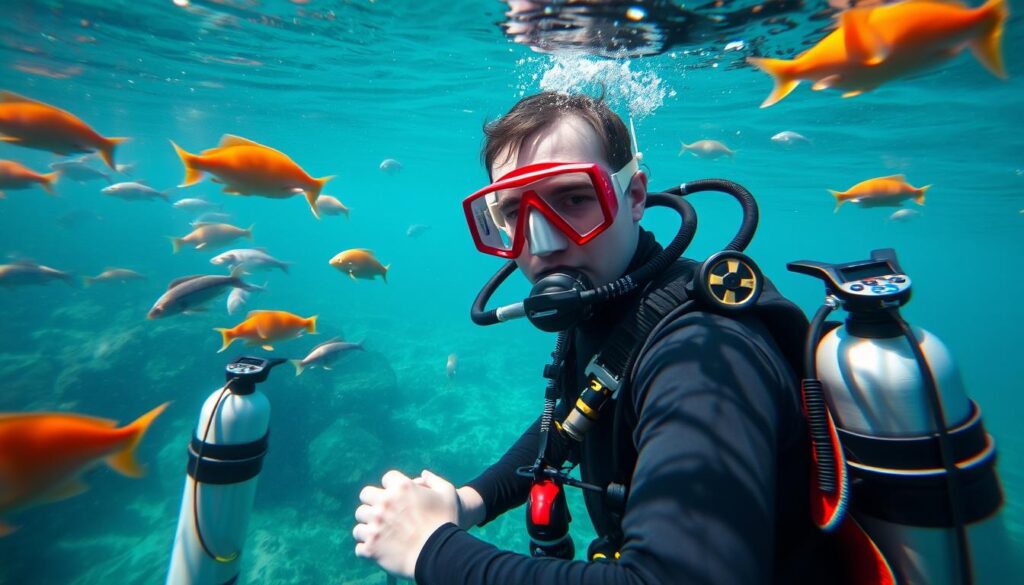
Before you dive, there are key health points to consider. They help make sure your dive is safe and fun.
Pre-Dive Health Screening
A detailed medical check is vital for diving safety. You should get a full health evaluation. This includes:
- Cardiovascular fitness assessment
- Lung function tests
- Neurological screening
- Blood pressure evaluation
Essential Vaccines and Medications
Travelers to Malawi need to take certain health steps:
- Hepatitis A and B vaccines
- Typhoid vaccination
- Malaria prophylaxis medications
- Traveler’s diarrhea prevention kit
Altitude and Diving Considerations
Lake Malawi is 1,640 feet above sea level. This presents special diving challenges. Divers need to be mindful of health risks from altitude.
| Diving Condition | Recommended Action |
|---|---|
| Post-Dive Flying | Wait 24 hours before air travel |
| Medical Conditions | Consult diving medical specialist |
| Fitness Level | Moderate cardiovascular fitness required |
“Your health is your most important diving equipment” – Diving Safety Expert
Always put your health first and get professional medical advice before diving in Malawi’s unique freshwater environment.
Wildlife Encounters Underwater
Lake Malawi is a unique place for underwater exploration. It’s unlike any other freshwater spot on Earth. Divers find a world full of colorful fish, just like coral reefs.
The lake is home to about 1,000 different cichlid species. These fish create a stunning underwater scene. They show how nature can adapt in amazing ways.
Cichlid Species Exploration
Diving in Lake Malawi is like seeing a colorful parade of fish. These cichlids have:
- Vibrant colors like electric blues and fiery oranges
- Special places in the lake’s ecosystem
- Interesting ways of living and reproducing
Diverse Marine Life Beyond Cichlids
But there’s more to Lake Malawi than just cichlids. Divers can also see:
- Small catfish
- Unique freshwater invertebrates
- Special aquatic creatures found nowhere else
Responsible Wildlife Interactions
“Observe, but never disturb” – The golden rule of underwater wildlife encounters.
Divers should keep their distance and not touch the fish. This helps protect the lake’s delicate balance. It makes sure we can explore underwater without harming it.
| Species Category | Estimated Population | Unique Characteristics |
|---|---|---|
| Cichlid Fish | 1,000+ Species | Extreme Color Variations |
| Endemic Fish | 90% Unique to Lake | Specialized Adaptations |
| Freshwater Invertebrates | Multiple Species | Complex Ecological Roles |
Lake Malawi’s underwater world is a living lab of evolution and diversity.
Photography Tips for Underwater Adventures
Exploring Lake Malawi underwater is a dream for photographers. The lake’s clear waters and colorful marine life are perfect for capturing amazing moments. These moments make your dive unforgettable.
To capture Lake Malawi’s beauty, you need the right gear and skills. Whether you’re a pro or just starting, you can take stunning photos. The key is to know how to use your equipment.
Essential Equipment for Underwater Photography
- Waterproof camera housing
- Wide-angle or fisheye lens
- Underwater strobe lights
- Compact action cameras
Techniques for Capturing Marine Life
Here are some tips to improve your underwater photos:
- Wait patiently for marine creatures to approach naturally
- Use soft, non-intrusive lighting
- Shoot during golden hour for warm, rich colors
- Focus on unique behaviors of cichlid fish
“Underwater photography is about patience, respect, and capturing the unexpected moments of marine life.”
Sharing Your Underwater Photos
When you share your photos, do it responsibly:
- Use social media platforms that support conservation
- Tag marine research organizations
- Educate your followers about Lake Malawi’s ecosystem
- Respect the privacy of local communities
Pro tip: Always ask permission before taking photos of local fishing communities. Respect their cultural boundaries.
Post-Dive Activities in Malawi
After diving into Lake Malawi’s wonders, your journey in Africa continues. You’ll find a world of fun activities. The Rift Valley is full of cultural experiences and places to relax.
Exploring Local Culture and Traditions
Dive into Malawi’s lively local traditions. These spots are perfect for learning about indigenous cultures:
- Visit traditional village markets
- Participate in local craft workshops
- Attend evening cultural performances
- Learn traditional dance movements
Best Spots for Relaxation
Relax after diving in Lake Malawi’s beautiful spots:
- Cape Maclear beach lounges
- Likoma Island sunset viewpoints
- Mumbo Island eco-retreats
- Blue Zebra Island Lodge relaxation areas
Delicious Local Cuisine to Try
Try Malawian dishes that show off the region’s food heritage:
- Nsima – traditional maize porridge
- Fresh lake fish preparations
- Locally grown vegetable stews
- Tropical fruit platters
“Travel is not just about the destination, but the experiences that transform you.” – Local Malawian Proverb
Your adventures after diving in Malawi will be unforgettable. They mix cultural learning, relaxation, and tasty food.
Diving Events and Competitions
Scuba Diving in Malawi is exciting for those who love the water. African Adventure Travel has made Lake Malawi a top spot for diving. It draws divers from all over the world.
The lake hosts two main diving competitions each year. These events offer great chances to meet other underwater fans:
- Spring Edition: May 30th to June 1st, 2025
- Fall Edition: September 26th to 28th, 2025
Competition Highlights
Divers face amazing challenges that test their skills. The competitions offer unique chances for everyone:
- Maximum Competition Depth: 85 meters
- Special Challenge Depth: 70 meters for professional freedivers
- Prizes available for every discipline
Participation Details
The events welcome all certified freedivers. It’s a place for learning and making friends. Participants get:
- Underwater photography services
- Live streaming on YouTube
- Pre-competition workshops
Registration Information
| Event | Registration Deadline | Locations |
|---|---|---|
| Spring Edition | May 15th, 2025 | Lake Malawi National Park |
| Fall Edition | September 8th, 2024 | Cape Maclear |
“These competitions are not just about diving, but about connecting with a global community of underwater enthusiasts.”
Scuba Diving in Malawi is perfect for both pros and hobbyists. It offers unforgettable experiences in Africa. These moments will stay with you forever, under Lake Malawi’s beautiful waters.
Travel Tips for an Unforgettable Experience
Planning a trip to Lake Malawi needs careful planning. Pack light, breathable clothes for the tropical weather. Also, bring dive gear that dries quickly. Don’t forget waterproof sunscreen, bug spray, and a water purifier for a safe trip.
It’s important to know local customs. Malawians value modest dress and friendly greetings. Learning Chichewa phrases can help you connect with locals. Always ask before taking photos and follow your dive guide’s advice on cultural matters.
Handling money in Malawi is easy. The Malawian Kwacha is the local currency, but US dollars work at tourist spots. Carry cash for small buys and tell your bank you’re traveling abroad. Credit cards are okay in cities and tourist areas, but cash is better in remote spots.
Get travel insurance that covers diving and medical emergencies. Bring a first-aid kit with your meds. Stay hydrated, protect from the sun, and keep fit to enjoy your diving adventure.
Malawi Recommended Scuba Diving Itinerary
To make the most of your scuba diving adventure in Malawi, it’s essential to plan a well-rounded itinerary that allows you to explore the diverse dive sites and experience the unique underwater ecosystems of the country. Here’s a recommended scuba diving itinerary that highlights some of the best diving locations in Malawi:
Day 1: Arrive in Lilongwe
After landing at Lilongwe International Airport, make your way to your accommodation in the city. Take some time to relax and acclimate to the surroundings.
Day 2-3: Cape Maclear
Start your diving journey by heading to Cape Maclear, located on the southern shores of Lake Malawi. Spend a couple of days exploring the incredible underwater world of Lake Malawi National Park. Dive at Cape Maclear Marine Reserve, where you can encounter a rich variety of fish species and vibrant coral formations.
Day 4-5: Nkhata Bay
Travel north to Nkhata Bay, a charming town nestled on the shores of Lake Malawi. Dive into the crystal-clear waters and explore the underwater wonders of this popular diving destination. Visit dive sites like Elephant Rock, known for its dramatic rock formations and diverse marine life.
Day 6-7: Likoma Island
Continue your journey to Likoma Island, home to some of the most stunning dive sites in Malawi. Dive along the pristine reefs of Mbeya Reef, where you can encounter colorful coral gardens and a plethora of fish species. Enjoy the tranquil island atmosphere and immerse yourself in the local culture during your stay.
Day 8-9: Chizumulu Island
From Likoma Island, take a short boat ride to Chizumulu Island. Explore the vibrant coral reefs surrounding the island, which are teeming with marine life. Dive into the clear waters and swim alongside schools of fish, encountering the impressive biodiversity that Lake Malawi has to offer.
Day 10-11: Domwe Island
Head to Domwe Island, a secluded and pristine island in Lake Malawi National Park. Dive around the island’s submerged boulders and experience the thrill of exploring unique underwater rock formations. Encounter freshwater eels and keep an eye out for the playful otters that inhabit the area.
Day 12-13: Monkey Bay
Travel south to Monkey Bay, a picturesque town on the southern shores of Lake Malawi. Dive at Mwala Reef, known for its remarkable visibility and abundant fish species. Immerse yourself in the turquoise waters and be amazed by the vibrant underwater world.
Day 14: Departure
Bid farewell to the enchanting waters of Lake Malawi and make your way back to Lilongwe for your departure. Take with you unforgettable memories and a deep appreciation for the beauty and biodiversity of Malawi’s underwater realm.
It’s important to note that this itinerary is flexible and can be customized to suit your preferences and the duration of your stay. You may also consider adding additional dive sites or extending your stay at certain locations to further explore the underwater treasures of Malawi.
Throughout your scuba diving itinerary, ensure you follow safe diving practices, adhere to local regulations, and respect the delicate marine ecosystems. Take the opportunity to immerse yourself in the local culture, indulge in the delicious Malawian cuisine, and enjoy the warm hospitality of the people.
By following this recommended scuba diving itinerary, you’ll have the opportunity to discover the stunning beauty of Lake Malawi’s underwater world, encounter diverse marine life, and create memories that will last a lifetime. Get ready for an extraordinary adventure as you explore the depths of Malawi’s captivating aquatic playground.
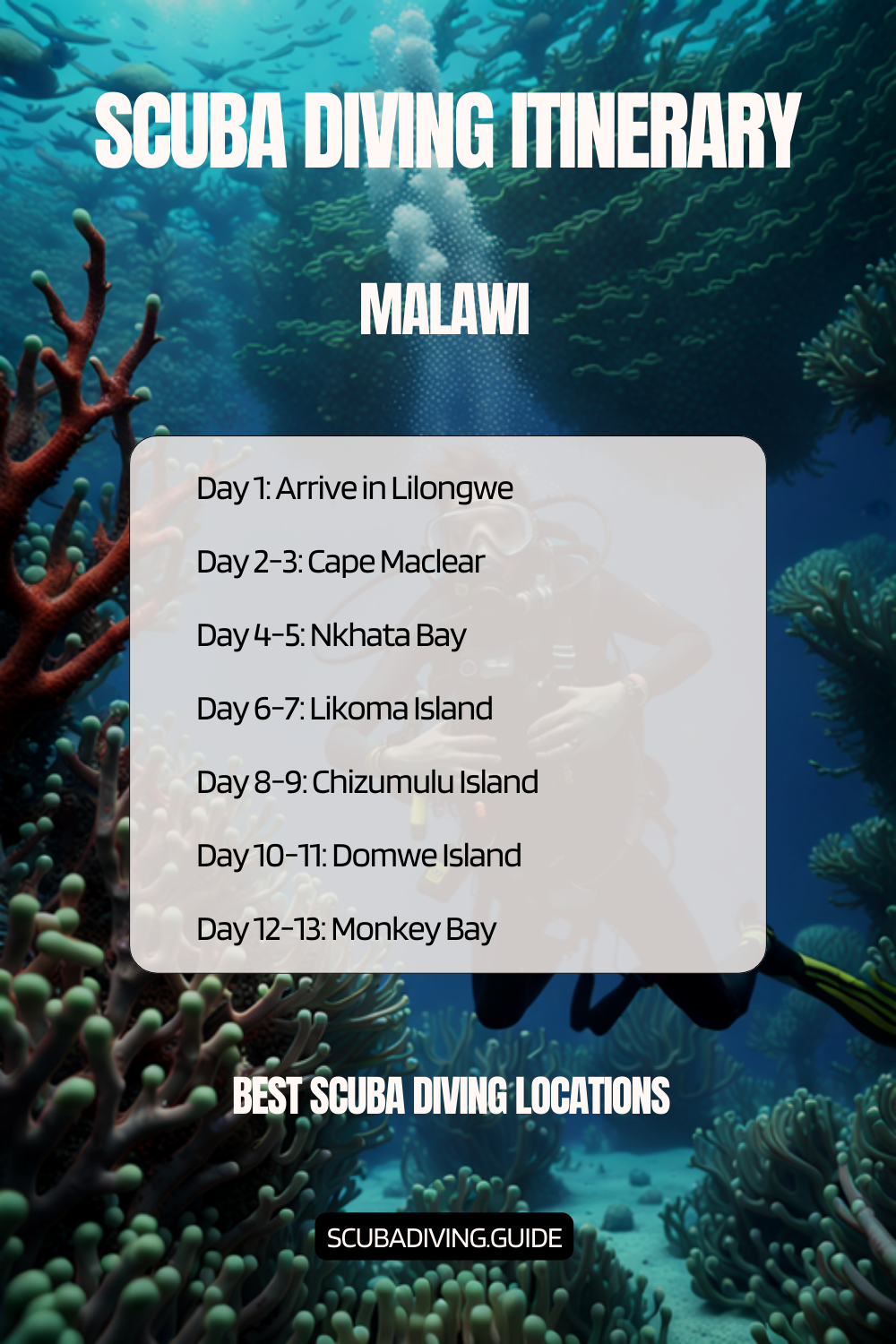
Other Countries to Consider
FAQ – Scuba Diving in Malawi
Is scuba diving in Lake Malawi safe?
Scuba diving in Lake Malawi is safe if you follow safety rules. Dive with trusted operators and stay healthy. Always use good equipment, dive with a buddy, and check for diseases like Bilharzia.
What makes Lake Malawi unique for diving?
Lake Malawi is special for its freshwater diving. It has amazing biodiversity, like unique cichlid species. The water is clear, and the underwater world is unlike anywhere else, making it a unique dive spot.
What equipment do I need for diving in Lake Malawi?
You might need to bring your own gear like masks and fins. Choose lightweight, freshwater-friendly equipment. Renting is easy, but personal gear fits better and is safer.
When is the best time to dive in Lake Malawi?
The best time to dive is from May to October. The water is clear, and the weather is nice. This is when marine life is most active.
Are there dive sites suitable for beginners?
Yes! Lake Malawi has great spots for beginners. Places like Cape Maclear and Nkhata Bay are calm and clear, perfect for new divers.
What kind of marine life can I expect to see?
You’ll see over 1,000 cichlid species, many unique to Lake Malawi. Expect to see colorful fish in amazing varieties, creating a vibrant underwater world.
Do I need special certifications to dive in Lake Malawi?
You don’t need advanced certifications for most dives. Local schools offer courses for all levels. Open Water certification is usually enough, but check with local operators.
How can I contribute to marine conservation while diving?
Dive responsibly by keeping distance from fish and not touching coral. Support local eco-tourism and choose dive operators that care about conservation.
What health precautions should I take before diving?
Talk to your doctor about vaccinations and check your diving fitness. Be aware of altitude sickness, as Lake Malawi is high up.
Are there photography opportunities while diving?
Yes, Lake Malawi is great for underwater photos, thanks to its unique cichlid species. Bring the right camera gear and consider the lighting for the best shots.
